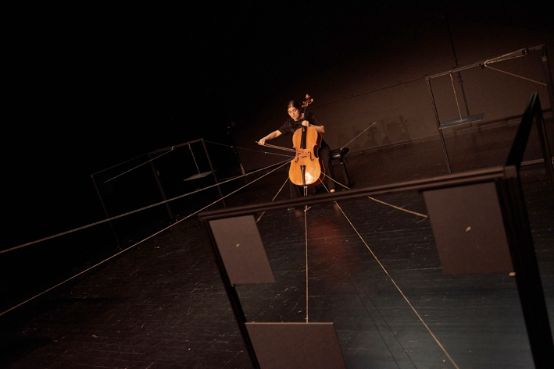Mass instead of class
The Stuttgart Eclat Festival lacks commitment and a musical basis. Fortunately, there are exceptions.

It's familiar from childhood: Two tin cans transport sound if they are connected with a taut thread. Marianthi Papalexandri-Alexandri uses this principle, but colors it in an adult way. The sound artist, who works in Zurich, Berlin and Ithaca in the USA, combines a cello with surfaces made of gray cardboard. Sometimes something like the scraping sounds of the bow come from the cardboard surfaces, sometimes rounder sounds from the cello. What sounds simple develops an incredible pull over the course of the 30-minute performance. Papalexandri-Alexandri simply has a knack for visual staging and for the sensitive "sound actions" of cellist Séverine Ballon. Born in Thessaloniki in 1974, she already impressed the audience with her sound installations at the most recent Donaueschingen Music Days. With Distance she has once again succeeded in creating an all-round coherent work, this time also developed with the resourceful kinetic artist Pe Lang.
Multimedia is still "in" - due to our smartphone worlds, efforts to breathe more "life" into music, and perhaps also - on the negative side - due to a certain helplessness about what music alone can still achieve. One thing is certain: Not all composers succeed in "fusing the arts". As part of the Eclat Festival, Clemens Gadenstätter from Austria presents an extensive piece of music theater called Daily Transformations with instrumental and vocal ensemble, video and spoken texts. It lasts more than an hour, but petered out early on in a noncommittal mishmash. The music is monotonous, the lyrics and videos incomprehensible. Anyone who embarks on a search for meaning can only come to one conclusion: Apparently it's about narrative denial, about torn continuities, which - somewhere - also have to do with our lifeworlds.
Frayed in the fray
"Less is more" - the architect Mies van der Rohe had already recognized this. Unfortunately, however, word has not gotten around among Stuttgart's composers and artists. At the Eclat Festival, there are not only 24 world premieres, but also many videos and, unfortunately, populistically pimped concerts with cheap cabaret interludes, which the Stuttgart vocal ensemble Neue Vocalsolisten in particular makes its own. The audience no longer has more than a friendly smile for it. Nevertheless, almost no Vocalsolisten concert is complete without exaggerated facial expressions or cheap gags such as a musician looking into the audience through his flute. Aha, a telescope then!
"What the hell is wrong with music?" Swiss music theorist and cellist Urs Frauchiger asked this question back in the early 1980s. Frauchiger also had his sights set on the festival business, which no longer trusted music, the joy of pure listening. Naturally, this is a dangerous development for music, which could be averted if dramaturges and concert organizers once again develop a sense of substance and good programming. Márton Illés, born in Hungary in 1975, writes wonderful music: substantial, authoritative sounds can be heard in his work presented by the Neue Vocalsolisten - now without gags. Hang-Rajzok. Before that came a very dense passwords for six voices by the old master Georges Aperghis. Between the vocal pieces, an impressive piece composed on natural tones Ultimi Fiori by the Italian composer Francesca Verunelli. This uninterrupted 45-minute concert was a highlight of the Eclat Festival.
The concert with the Ensemble ascolta was incomparably louder. Stefan Keller, born in Zurich in 1974 and awarded the Composition Prize of the City of Stuttgart in 2004, wrote a world premiere of the piece hybrid gaits for drumset, keyboard and ensemble. One focus of the almost 20-minute piece is on the rhythmic level; consequently, the drums and the brilliant soloist Daniel Eichholz take center stage. A drumset commonly used in rock music provides the sound balance. Only loud wind instruments and a keyboard with synthesized and sampled sounds can compete with a snare. Keller thinks little of stylistic pigeonholing. In the end, his hybrid gaits but still reminiscent of free jazz - which is not necessarily a bad sign when you think of its freshness and unpredictability.
LINK








